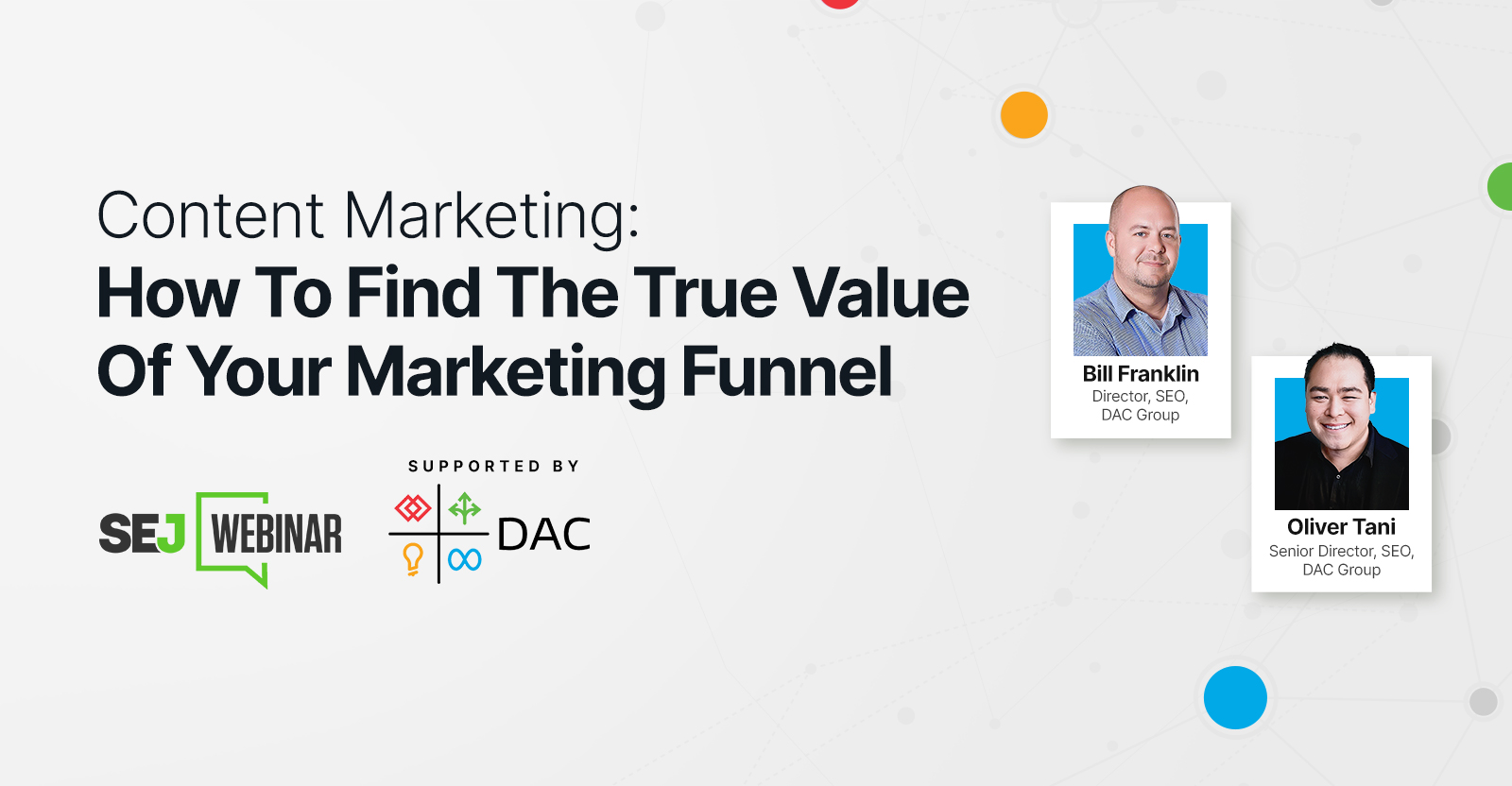SEO
How To Stay Up-to-Date In The SEO Industry

Search engine optimization (SEO) is a tricky field. Just when you think you’ve got a handle on it, Google goes and changes the algorithm and what used to work doesn’t work so well anymore. or there’s a new element to add to your SEO bag.
Though you may want to write this off as a “cost of doing business” in SEO, these constant changes are actually for a good reason: Google is always trying to develop a better understanding of how people use the internet.
Changes to search algorithms are made with the goal of providing better, more relevant information to users.
And while this is great for users, it also means SEO professionals must constantly stay up-to-date on the latest changes and best practices. And that can be a major time commitment by itself.
But never fear, we’re here to help.
Tips For Staying On Top Of SEO Trends
Whether you’re an experienced SEO professional or are just getting started in your career, here are some ways you can stay in the know about what’s happening in the industry.
Subscribe To Leading SEO Blogs And Email Newsletters
It’s no secret that Google is the top dog in the search engine field.
As of February 2022, it accounts for a whopping 92% of search engine market share – which is what you would probably expect for a company whose name has become a verb meaning “to look up.”
And because Google is such a giant in the field, any SEO pro worth his or her salt should make sure to check the Google Search Central Blog on a regular basis.
Run by the search engine giant itself; it’s where you can find official updates to the Google Search Core algorithm, announcements about new search features, and articles on SEO best practices.
While Google’s blog is the gospel search engine optimization is performed by, there are several other valuable resources on the internet written by digital marketing experts.
We’d be remiss, of course, if we didn’t list ourselves first. Search Engine Journal exists for the sole purpose of keeping busy SEO people in the loop.
And while we humbly consider ourselves a top resource, other blogs and email newsletters you should be reading include Kevin Indig’s, Moz, SEO Fomo and Yoast.
For your convenience, we’ve compiled a list of 38 other resources you may find helpful.
Join Communities And Forums
SEO is a community and professionals love to share their knowledge. It was my participation in two or three communities that led to the launch of SEJ almost 19 years ago.
Gathering as much knowledge as you can ensures your strategies are effective and gives you the page rankings you want.
One of the best ways to do this is to read and participate in forums on the topic.
One of the most popular communities for SEO (and just about everything else) is on Reddit. Users can create posts, ask questions and share articles.
Content on this social platform is “upvoted” or “downvoted,” depending on the community’s opinion of it. This encourages quality posts to rise to the top, while poor-quality ones quickly disappear.
The SEO subreddit can be used for everything from job searching to troubleshooting, serving as a strategic sounding board to tracking new developments in the field.
For people with specific questions, Quora is an excellent resource.
Designed as a place to share knowledge, it allows users to ask questions, which are in turn answered by the community.
Update Your News Feed And Follow Thought Leaders On Social Media
Love it or hate it, there’s no question social media has changed the world.
And while the downside is it allows your, um, quirky uncle to share his thoughts on the connection between sasquatch, aliens, and the JFK assassination, it also allows you to connect with people like never before.
And if you’re not using this professionally, you’re missing a huge opportunity.
Twitter, LinkedIn, and yes, even Facebook, give you unparalleled access to professionals who have built their careers by sharing their experience.
With a few clicks, you can start receiving the SEO thoughts of people like Danny Sullivan and John Mueller. In addition to Danny & John, here are 202 SEO Experts who we feel that you should be following on Twitter and other social channels.
By updating your newsfeed to include these people, you’ll not only benefit from the immense level of knowledge they share, but you’ll ensure you stay in the know about any developments within the SEO world.
For your convenience, we’ve compiled a list of top SEO experts you should be following here.
Listen To Podcasts
Do you have a lot of other commitments, and don’t always have hours to dedicate to perusing the internet to stay on top of the latest best practices?
Once again, modern technology to the rescue.
Podcasts are a great way to get trustworthy tips directly from notable industry experts.
And you can consume them anywhere from the train during your morning commute to the treadmill during your workout.
Not sure what podcasts you should be listening to? Don’t worry, we’ve put together a handy list of 17 of the best SEO podcasts in the business.
And no list would ever be complete without mentioning our very own Search Engine Journal Show, where we talk all things SEO, PPC, social media, content marketing, and digital marketing with the top industry experts and authorities.
Watch YouTube Videos And SEO Webinars
Are you old enough to remember what life was like before the internet?
If so, you probably remember the frustration that came with figuring things out on your own, rather than pulling up your phone and watching a quick tutorial video.
Luckily the bad old days are behind us, and we now have access to an unprecedented amount of information, including helpful videos on platforms like YouTube and webinars hosted by experts.
Many leaders in the field of SEO have YouTube channels where they regularly upload content.
These usually short videos are an excellent way to pick up quick tips and find solutions to problems you’re facing.
Channels worth following include The SEO Video Show, Ahrefs, Matt Diggity (more of a casual, Mr. Beast feel) and, of course, Search Engine Journal.
If you have a little more time to dedicate to your SEO education, webinars are a great way to expand your knowledge.
For top-quality SEO learning, there are three main contributors: Semrush, BrightEdge and, you guessed it, Search Engine Journal.
Usually available on-demand if you miss the live presentation, these are an effective way to stay up to date with what’s happening in the field.
Attend Conferences And Build Your Network
The most valuable resource for any organization is its people. That’s why there’s an entire division called “human resources.”
But, you don’t have to work in the same office, organization, or even country to benefit from the knowledge of other SEO professionals.
To ensure your continued success in the field of search engine optimization, it’s important to expand your network.
By getting acquainted with other people in the industry, you can mimic their successful strategies, learn from their failures, and stay on top of what’s trending – and one of the best places to do this is at SEO conferences.
In a pre-pandemic world, there was no better way to put your finger on the pulse of the world of search engine rankings and connect with industry leaders than on the floor of a summit or at the evening cocktail hour. And it was a great way to make new friends too.
Though Covid-19 put a temporary limit on in-person gatherings, they’re starting to pick up again, which means attendees are once again able to expand their networks and gain a deeper understanding of how top SEO professionals are getting results.
Final Thoughts
If you’ve read this far, hopefully, we’ve impressed upon you the importance of staying up to date on the constantly shifting world of search engine optimization and given you some resources you can use to do so.
But even if you’re someone who loves your job, you undoubtedly have other commitments in your life.
And staying abreast of the latest best practices can feel like a full-time job in itself.
You simply don’t have time to spend all day, every day tracking the latest trends and best practices. And even if you could, that wouldn’t give you the bandwidth to implement these new strategies.
But that’s why we created this piece: to show you the many ways you can learn and follow what’s happening in SEO.
Maybe it’s part of your morning routine, where after checking your email, you spend some time reading the latest articles.
Maybe you routinely listen to our podcast while stuck in traffic. Or maybe you prefer lunch-and-learns, where you watch webinars while you’re taking your lunch break.
There’s a wealth of SEO information out there from a lot of experts who can help you take your rankings to the next level.
It’s up to you how you’ll use their information, tips, and tricks to make the most out of them.
More Resources:
Featured Image: GaudiLab/Shutterstock
SEO
Measuring Content Impact Across The Customer Journey

Understanding the impact of your content at every touchpoint of the customer journey is essential – but that’s easier said than done. From attracting potential leads to nurturing them into loyal customers, there are many touchpoints to look into.
So how do you identify and take advantage of these opportunities for growth?
Watch this on-demand webinar and learn a comprehensive approach for measuring the value of your content initiatives, so you can optimize resource allocation for maximum impact.
You’ll learn:
- Fresh methods for measuring your content’s impact.
- Fascinating insights using first-touch attribution, and how it differs from the usual last-touch perspective.
- Ways to persuade decision-makers to invest in more content by showcasing its value convincingly.
With Bill Franklin and Oliver Tani of DAC Group, we unravel the nuances of attribution modeling, emphasizing the significance of layering first-touch and last-touch attribution within your measurement strategy.
Check out these insights to help you craft compelling content tailored to each stage, using an approach rooted in first-hand experience to ensure your content resonates.
Whether you’re a seasoned marketer or new to content measurement, this webinar promises valuable insights and actionable tactics to elevate your SEO game and optimize your content initiatives for success.
View the slides below or check out the full webinar for all the details.
SEO
How to Find and Use Competitor Keywords

Competitor keywords are the keywords your rivals rank for in Google’s search results. They may rank organically or pay for Google Ads to rank in the paid results.
Knowing your competitors’ keywords is the easiest form of keyword research. If your competitors rank for or target particular keywords, it might be worth it for you to target them, too.
There is no way to see your competitors’ keywords without a tool like Ahrefs, which has a database of keywords and the sites that rank for them. As far as we know, Ahrefs has the biggest database of these keywords.
How to find all the keywords your competitor ranks for
- Go to Ahrefs’ Site Explorer
- Enter your competitor’s domain
- Go to the Organic keywords report
The report is sorted by traffic to show you the keywords sending your competitor the most visits. For example, Mailchimp gets most of its organic traffic from the keyword “mailchimp.”


Since you’re unlikely to rank for your competitor’s brand, you might want to exclude branded keywords from the report. You can do this by adding a Keyword > Doesn’t contain filter. In this example, we’ll filter out keywords containing “mailchimp” or any potential misspellings:


If you’re a new brand competing with one that’s established, you might also want to look for popular low-difficulty keywords. You can do this by setting the Volume filter to a minimum of 500 and the KD filter to a maximum of 10.


How to find keywords your competitor ranks for, but you don’t
- Go to Competitive Analysis
- Enter your domain in the This target doesn’t rank for section
- Enter your competitor’s domain in the But these competitors do section


Hit “Show keyword opportunities,” and you’ll see all the keywords your competitor ranks for, but you don’t.


You can also add a Volume and KD filter to find popular, low-difficulty keywords in this report.


How to find keywords multiple competitors rank for, but you don’t
- Go to Competitive Analysis
- Enter your domain in the This target doesn’t rank for section
- Enter the domains of multiple competitors in the But these competitors do section


You’ll see all the keywords that at least one of these competitors ranks for, but you don’t.


You can also narrow the list down to keywords that all competitors rank for. Click on the Competitors’ positions filter and choose All 3 competitors:


- Go to Ahrefs’ Site Explorer
- Enter your competitor’s domain
- Go to the Paid keywords report


This report shows you the keywords your competitors are targeting via Google Ads.
Since your competitor is paying for traffic from these keywords, it may indicate that they’re profitable for them—and could be for you, too.
You know what keywords your competitors are ranking for or bidding on. But what do you do with them? There are basically three options.
1. Create pages to target these keywords
You can only rank for keywords if you have content about them. So, the most straightforward thing you can do for competitors’ keywords you want to rank for is to create pages to target them.
However, before you do this, it’s worth clustering your competitor’s keywords by Parent Topic. This will group keywords that mean the same or similar things so you can target them all with one page.
Here’s how to do that:
- Export your competitor’s keywords, either from the Organic Keywords or Content Gap report
- Paste them into Keywords Explorer
- Click the “Clusters by Parent Topic” tab


For example, MailChimp ranks for keywords like “what is digital marketing” and “digital marketing definition.” These and many others get clustered under the Parent Topic of “digital marketing” because people searching for them are all looking for the same thing: a definition of digital marketing. You only need to create one page to potentially rank for all these keywords.


2. Optimize existing content by filling subtopics
You don’t always need to create new content to rank for competitors’ keywords. Sometimes, you can optimize the content you already have to rank for them.
How do you know which keywords you can do this for? Try this:
- Export your competitor’s keywords
- Paste them into Keywords Explorer
- Click the “Clusters by Parent Topic” tab
- Look for Parent Topics you already have content about
For example, if we analyze our competitor, we can see that seven keywords they rank for fall under the Parent Topic of “press release template.”


If we search our site, we see that we already have a page about this topic.


If we click the caret and check the keywords in the cluster, we see keywords like “press release example” and “press release format.”


To rank for the keywords in the cluster, we can probably optimize the page we already have by adding sections about the subtopics of “press release examples” and “press release format.”
3. Target these keywords with Google Ads
Paid keywords are the simplest—look through the report and see if there are any relevant keywords you might want to target, too.
For example, Mailchimp is bidding for the keyword “how to create a newsletter.”


If you’re ConvertKit, you may also want to target this keyword since it’s relevant.
If you decide to target the same keyword via Google Ads, you can hover over the magnifying glass to see the ads your competitor is using.


You can also see the landing page your competitor directs ad traffic to under the URL column.


Learn more
Check out more tutorials on how to do competitor keyword analysis:
SEO
Google Confirms Links Are Not That Important

Google’s Gary Illyes confirmed at a recent search marketing conference that Google needs very few links, adding to the growing body of evidence that publishers need to focus on other factors. Gary tweeted confirmation that he indeed say those words.
Background Of Links For Ranking
Links were discovered in the late 1990’s to be a good signal for search engines to use for validating how authoritative a website is and then Google discovered soon after that anchor text could be used to provide semantic signals about what a webpage was about.
One of the most important research papers was Authoritative Sources in a Hyperlinked Environment by Jon M. Kleinberg, published around 1998 (link to research paper at the end of the article). The main discovery of this research paper is that there is too many web pages and there was no objective way to filter search results for quality in order to rank web pages for a subjective idea of relevance.
The author of the research paper discovered that links could be used as an objective filter for authoritativeness.
Kleinberg wrote:
“To provide effective search methods under these conditions, one needs a way to filter, from among a huge collection of relevant pages, a small set of the most “authoritative” or ‘definitive’ ones.”
This is the most influential research paper on links because it kick-started more research on ways to use links beyond as an authority metric but as a subjective metric for relevance.
Objective is something factual. Subjective is something that’s closer to an opinion. The founders of Google discovered how to use the subjective opinions of the Internet as a relevance metric for what to rank in the search results.
What Larry Page and Sergey Brin discovered and shared in their research paper (The Anatomy of a Large-Scale Hypertextual Web Search Engine – link at end of this article) was that it was possible to harness the power of anchor text to determine the subjective opinion of relevance from actual humans. It was essentially crowdsourcing the opinions of millions of website expressed through the link structure between each webpage.
What Did Gary Illyes Say About Links In 2024?
At a recent search conference in Bulgaria, Google’s Gary Illyes made a comment about how Google doesn’t really need that many links and how Google has made links less important.
Patrick Stox tweeted about what he heard at the search conference:
” ‘We need very few links to rank pages… Over the years we’ve made links less important.’ @methode #serpconf2024″
Google’s Gary Illyes tweeted a confirmation of that statement:
“I shouldn’t have said that… I definitely shouldn’t have said that”
Why Links Matter Less
The initial state of anchor text when Google first used links for ranking purposes was absolutely non-spammy, which is why it was so useful. Hyperlinks were primarily used as a way to send traffic from one website to another website.
But by 2004 or 2005 Google was using statistical analysis to detect manipulated links, then around 2004 “powered-by” links in website footers stopped passing anchor text value, and by 2006 links close to the words “advertising” stopped passing link value, links from directories stopped passing ranking value and by 2012 Google deployed a massive link algorithm called Penguin that destroyed the rankings of likely millions of websites, many of which were using guest posting.
The link signal eventually became so bad that Google decided in 2019 to selectively use nofollow links for ranking purposes. Google’s Gary Illyes confirmed that the change to nofollow was made because of the link signal.
Google Explicitly Confirms That Links Matter Less
In 2023 Google’s Gary Illyes shared at a PubCon Austin that links were not even in the top 3 of ranking factors. Then in March 2024, coinciding with the March 2024 Core Algorithm Update, Google updated their spam policies documentation to downplay the importance of links for ranking purposes.
The documentation previously said:
“Google uses links as an important factor in determining the relevancy of web pages.”
The update to the documentation that mentioned links was updated to remove the word important.
Links are not just listed as just another factor:
“Google uses links as a factor in determining the relevancy of web pages.”
At the beginning of April Google’s John Mueller advised that there are more useful SEO activities to engage on than links.
Mueller explained:
“There are more important things for websites nowadays, and over-focusing on links will often result in you wasting your time doing things that don’t make your website better overall”
Finally, Gary Illyes explicitly said that Google needs very few links to rank webpages and confirmed it.
I shouldn’t have said that… I definitely shouldn’t have said that
— Gary 鯨理/경리 Illyes (so official, trust me) (@methode) April 19, 2024
Why Google Doesn’t Need Links
The reason why Google doesn’t need many links is likely because of the extent of AI and natural language undertanding that Google uses in their algorithms. Google must be highly confident in its algorithm to be able to explicitly say that they don’t need it.
Way back when Google implemented the nofollow into the algorithm there were many link builders who sold comment spam links who continued to lie that comment spam still worked. As someone who started link building at the very beginning of modern SEO (I was the moderator of the link building forum at the #1 SEO forum of that time), I can say with confidence that links have stopped playing much of a role in rankings beginning several years ago, which is why I stopped about five or six years ago.
Read the research papers
Authoritative Sources in a Hyperlinked Environment – Jon M. Kleinberg (PDF)
The Anatomy of a Large-Scale Hypertextual Web Search Engine
Featured Image by Shutterstock/RYO Alexandre
-

 PPC4 days ago
PPC4 days ago19 Best SEO Tools in 2024 (For Every Use Case)
-

 MARKETING7 days ago
MARKETING7 days agoWill Google Buy HubSpot? | Content Marketing Institute
-
SEARCHENGINES7 days ago
Daily Search Forum Recap: April 16, 2024
-

 SEO7 days ago
SEO7 days agoGoogle Clarifies Vacation Rental Structured Data
-

 MARKETING6 days ago
MARKETING6 days agoStreamlining Processes for Increased Efficiency and Results
-
SEARCHENGINES6 days ago
Daily Search Forum Recap: April 17, 2024
-

 SEO6 days ago
SEO6 days agoAn In-Depth Guide And Best Practices For Mobile SEO
-

 PPC6 days ago
PPC6 days ago97 Marvelous May Content Ideas for Blog Posts, Videos, & More















You must be logged in to post a comment Login